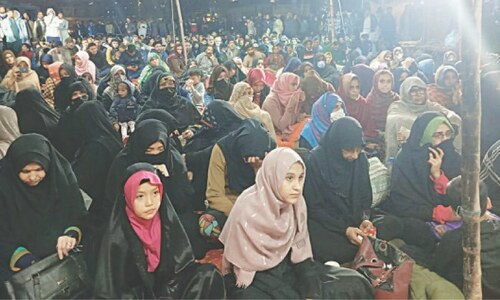KARACHI: With religious leaders, policemen, political representatives and women from conflict prone areas in attendance, the training sessions organised by the Sustainable Peace and Development Organisation (SPADO) and National Centre for Dispute Resolution (NCDR) aimed to facilitate the mechanism of mediation amongst communities.
The second day of the session catering to women from areas such as Korangi, Sultanabad, Jamhuria Colony and Hijrat Colony saw Ebrahim Saifuddin from NCDR aid the participants through alternative dispute mechanism (ADR) as they took up the responsibility to become mediators in their areas to resolve disputes that often end up in courts. Participants belonged to Hazara Hindko and Sindhi communities and from different religious backgrounds.
Shedding light on the importance of mediation in such disputes, Raza Shah Khan of SPADO said that “it’s a common practice in other parts of the world to involve a mediator between affected parties before referring the case to a court as innumerable cases are lying in wait causing problems for the parties who not only lose wealth but also their time in order to attain justice.”
He added that while considerable progress in this regard has been seen in Khyber Pakhtunkhwa and Punjab, Sindh is yet to adopt the system of mediation and that there is a dire need of government support.
“The main aim of the sessions was to train individuals so that they would be able to deal with conflicts to ensure harmony and play a vital role in bringing communities closer. Karachi is a multicultural city with many indigenous communities thriving and perhaps this is why this mechanism is crucial as it will promote peace and steer them away from violence,” he added.
As the women took the role of mediators and raised their voice to argue on behalf of their representing parties, Mr Saifuddin along with former sessions judge Rana Zaki Shamsi and magistrate Wishaal Shamsi observed each of them and later pointed out the mistakes they made while mediating. “We have also asked government representatives to give room to mediation within the police stations to avoid later complications. If police personnel are well trained enough to handle such issues, many problems can be solved easily,” said Mr Saifuddin. He added that religious leaders of communities thoroughly understood the need for this and were accommodating in their views.
Published in Dawn, October 30th, 2015
On a mobile phone? Get the Dawn Mobile App: Apple Store | Google Play














































Dear visitor, the comments section is undergoing an overhaul and will return soon.